I had this "java.lang.OutOfMemoryError: Java heap space " and I read and understand that I can increase my memory using -Xmx1024m. But I think in my code I can change something to this error does not happen anymore.
First, this is the image from VisualVM about my memory :

In the image you can see that the object "Pedidos" is not so big and I have the another object "Enderecos" that have more and less the same size but is not complete because I have the error before the object is completed.
The point is :
- I have 2 classes that search for a big csv file ( 400.000 values each ), I will show the code. I tried to use Garbage Collector, set variables as null, but is not working, can anyone help me please? Here is the Code from the class "Pedidos", the class "Enderecos" is the same and my project is just calling this 2 classes.
// all Imports
import java.io.BufferedReader;
import java.io.File;
import java.io.FileNotFoundException;
import java.io.FileReader;
import java.io.IOException;
import java.io.Reader;
import java.util.ArrayList;
import javax.swing.JOptionPane;
import Objetos.Pedido;
// CLASS
public class GerenciadorPedido{
// ArrayList I will add all the "Pedidos" Objects
ArrayList<Pedido> listaPedidos = new ArrayList<Pedido>();
// Int that I need to use the values correctly
int helper;
// I create this global because I didnt want to create a new String everytime the for is running (trying to use less memory)
String Campo[];
String Linha;
String newLinha;
public ArrayList<Pedido> getListaPedidos() throws IOException {
// Here I change the "\" and "/" to be accepted be the FILE (the csv address)
String Enderecotemp = System.getProperty("user.dir"), Endereco = "";
char a;
for (int i = 0; i < Enderecotemp.length(); i++) {
a = Enderecotemp.charAt(i);
if (a == '\\') a = '/';
Endereco = Endereco + String.valueOf(a);
}
Endereco = Endereco + "/Pedido.csv";
// Open the CSV File and the reader to read it
File NovoArquivo = new File(Endereco);
Reader FileLer = null;
// Try to read the File
try
{
FileLer = new FileReader(NovoArquivo);
}
catch(FileNotFoundException e) {
JOptionPane.showMessageDialog(null, "Erro, fale com o Vini <Arquivo de Pedido Não Encontrado>");
}
// Read the File
BufferedReader Lendo = new BufferedReader(FileLer);
try
{
// Do for each line of the csv
while (Lendo.ready()) {
// Read the line and replace the caracteres ( needed to funcionality works )
Linha = Lendo.readLine();
newLinha = Linha.replaceAll("\"", "");
newLinha = newLinha.replaceAll(",,", ", , ");
newLinha = newLinha.replaceAll(",,", ", , ");
newLinha = newLinha + " ";
// Create Campo[x] for each value between ","
Campo = newLinha.split(",");
// Object
Pedido pedido = new Pedido();
helper = 0;
// Just to complete the object with the right values if the Campo.length have 15, 16, 17, 18 or 19 of size.
switch (Campo.length) {
case 15: pedido.setAddress1(Campo[9]);
break;
case 16: pedido.setAddress1(Campo[9] + Campo[10]);
helper = 1;
break;
case 17: pedido.setAddress1(Campo[9] + Campo[10] + Campo[11]);
helper = 2;
break;
case 18: pedido.setAddress1(Campo[9] + Campo[10] + Campo[11] + Campo[12]);
helper = 3;
break;
case 19: pedido.setAddress1(Campo[9] + Campo[10] + Campo[11] + Campo[12] + Campo[13]);
helper = 4;
break;
}
// Complete the Object
pedido.setOrder(Campo[0]);
pedido.setOrderValue(Float.parseFloat(Campo[1]));
pedido.setOrderPv(Float.parseFloat(Campo[2]));
pedido.setCombinedOrderFlag(Campo[3]);
pedido.setCombineOrder(Campo[4]);
pedido.setOrderType(Campo[5]);
pedido.setOrderShipped(Campo[6]);
pedido.setOrderCancelled(Campo[7]);
pedido.setTransactionType(Campo[8]);
pedido.setAddress2(Campo[10 + helper]);
pedido.setAddress3(Campo[11 + helper]);
pedido.setPost(Campo[12 + helper]);
pedido.setCity(Campo[13 + helper]);
pedido.setState(Campo[14 + helper]);
// Add the object in the ArrayList
listaPedidos.add(pedido);
// Set everything to null to start again
Campo = null;
Linha = null;
newLinha = null;
}
}
catch(IOException e) {
// TODO Auto-generated catch block
e.printStackTrace();
}
finally
{
// Close the file and run garbage collector to try to clear the trash
Lendo.close();
FileLer.close();
System.gc();
}
// return the ArrayList.
return listaPedidos;
}
}
The project runs this class, but when the project try to run the another ( the same as this one, changing just names and the csv ), I have the memory Error. I don't know how can I clear this char[] and String that is to big as can you see on the image. Any new Ideas ? Is really impossible without increase the memory ?